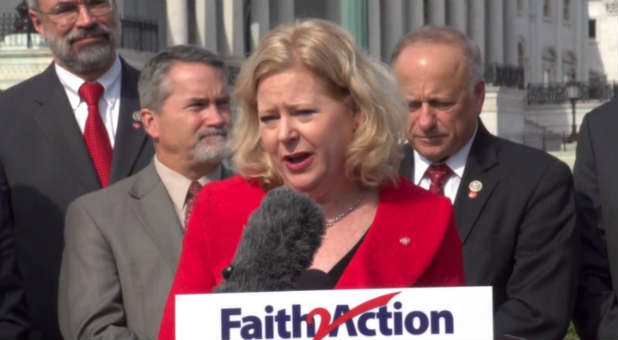How One Woman Started the Heartbeat Bill Movement Sweeping America
Missouri Gov. Mike Parson on Friday signed the eighth heartbeat bill into law.
Since 1973, over 60 million babies have been aborted in America. While Christians have opposed abortion, their efforts have been primarily focused on simply regulating, not eliminating it—and those efforts have been largely unsuccessful.
Recently, however, the pro-life movement has adopted a different approach. Earlier this month, Alabama made headlines for its near-total ban on abortions, and Missouri is in the process of passing similar legislation. Four more states—Georgia, Kentucky, Mississippi and Ohio—have passed “heartbeat bills,” legislation that bans abortions on babies whose heartbeats can be detected in the womb.
Those heartbeat bills originated with Janet Porter. On today’s episode of “In-Depth with Stephen Strang,” I had the privilege of speaking to Porter, who is not just a longtime friend but one of the most well-known and respected pro-life advocates in the country.
She used to believe in an incremental approach, but after the death of fellow pro-life colleague Mark Lally, she told me she realized it was time to stop messing around and finally end abortion.
“We had been incrementally trying to regulate around the edges of abortion,” Porter says. “Honestly, I was a part of that effort because we thought that’s all we could do. I lobbied hard for things like parental consent, a woman’s right to know, 24-hour waiting periods, fetal homicide, even lobbied for the nation’s first ban on partial birth abortion. But at the end of the day, [after] all the work we’ve done in the last 46 years, … we’ve regulated abortion, but there are still more than a million children who are aborted every year. I’ll tell you something: That is not success, any way you measure it. When you’ve got a million casualties every year after four decades of fighting—that’s not success. So if we want to have different results, we have to try a different approach. And that’s where the heartbeat bill comes in.”
Porter says she first had the idea for this type of bill in the 1980s, but other pro-life leaders nixed the idea because they thought the timing was wrong. But in late 2010, Porter assembled a team of 20 attorneys to draft the first heartbeat bill.
“Here’s the premise: If a heartbeat’s detected, the baby’s protected,” she says. “You know, it’s the same for any human being in any hospital around the world. … If you found a body lying on the ground, what would you do? You wouldn’t just plan a funeral. You would check for a pulse. Why? Because the heartbeat is the universally recognized indicator of life. Why should we ignore it when it comes to the very young? Why should we discriminate against children in the womb? What the heartbeat bill does is it doesn’t get us all the way to the finish line of conception, when each of our lives began, but it is a scientific step that gets us almost all the way there and protects every child whose heartbeat can be heard. To deny a heartbeat is to deny science—and that’s what we’re finding with those who oppose it. They are really running from technology.”
With so many states adopting pro-life measures, it seems a tipping point has taken place in our country. Porter says it was actually New York’s horrifying abortion law earlier this year that ultimately made the difference.
“I believe this year was the tipping point,” Porter says. “It began on Jan. 22 when New York overplayed their hands. They applauded the effort of killing babies until birth. … As New York is saying ‘We’re going to kill them until the process of delivery of birth,’ that’s when we saw Mississippi pass a heartbeat bill. And then Kentucky passed a heartbeat law. Then finally we did it this month in May. Then Georgia. Then Missouri. Louisiana, I believe, is next. South Carolina’s making progress. We’re seeing it all over the country. Alabama passed a bill better than the heartbeat bill. They have a bill to protect from the moment of conception. They’ve always been very pro-life and able to exceed the hopes and expectations of the rest of the country. But it’s wonderful.”
Porter says she fully expects these bills to be challenged and sent to the Supreme Court. In fact, that’s what she’s hoping for.
“When we crafted the heartbeat bill, we knew it was destined for the Supreme Court,” Porter says. “We knew there would be a challenge, because that’s how this goes. Pro-abortion [lobbyists] don’t want to keep hearts beating. They’re going to challenge it in the courts. Well, guess what? This bill was crafted to be the arrow in the heart of Roe v. Wade. It is destined, I believe, to bring the fatal blow to abortion on demand. And I believe it’s going to happen very, very soon.”
If you’d like to get involved, you can download a model of the heartbeat bill here and take it to your state representative. After all, your elected officials work for you, so tell them what matters to you.
If Janet’s message inspired you, share this article with a friend and listen to my “In Depth With Stephen Strang” podcast right here or at the top of this article.




























































